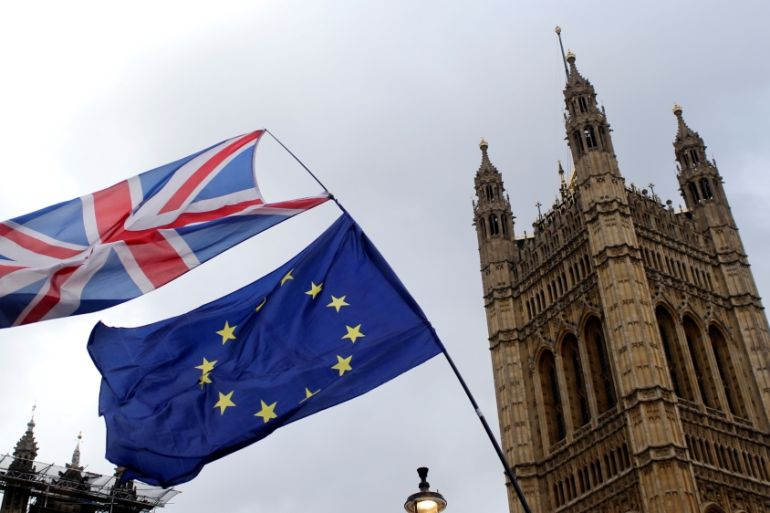Children’s rights could suffer after Brexit, charity warns
Legal issues could arise for children in relation to the EU Settlement Scheme, says Coram Children’s Legal Centre.

London, United Kingdom – Thousands of children with EU citizenship or those of European nationals could fall through the cracks of the UK’s registration system after Brexit, according to a UK charity.
The Coram Children’s Legal Centre released a report on Monday pointing to issues that might arise for children and young people in relation to the EU Settlement Scheme, which will be fully rolled out by the end of the month.
Keep reading
list of 4 itemsChildren slide down destroyed Gaza mosque
Why mass kidnappings still plague Nigeria a decade after Chibok abductions
‘Over my dead body’, say Gambian mothers amid efforts to lift FGM ban
The scheme is designed to register around 3.5 million citizens in the UK from the EU’s 27 countries.
They must apply online for “settled status” if they have lived in the UK for at least five years, or “pre-settled status” if they haven’t reached that threshold. The application is free.
Anyone who fails to apply or is denied status by June 2021 if the UK leaves the EU with a deal, or December 2020 of it leaves without, will become undocumented.
The government and Prime Minister Theresa May have repeatedly assured EU citizens they will be able to continue living and working in the UK after Brexit.
But rights groups have raised concerns that should even a fraction of applications go wrong, given the scale of the task, it could result in thousands of people living in the UK becoming undocumented two years down the line.
Vulnerable groups
Among the vulnerable groups, says Coram, are unaccompanied children and young adults who have grown up in UK care homes or foster care, as well as children from disadvantaged families.
Children separated from one of their parents are also at risk.
“The Home Office from the start hasn’t recognised the complexity of the lives that are going to be interrupted by the scheme,” Marianne Lagrue, a policy manager at Coram Children’s Legal Centre and co-author of the report, told Al Jazeera.
“For people who are working, it’s very straightforward. Everything is almost automatic. But for anyone whose life falls outside that straightforward pattern, it gets quite complicated quite quickly,” she added.
According to the Migration Observatory at Oxford University, there are an estimated 900,000 children of EU-born parents living in the UK, excluding Irish citizens. About 239,000 of them were born in the UK but do not have an automatic right to British citizenship.
The Home Office, the government department in charge of migration and security, has estimated there are approximately 5,000 EU children in care in the UK, not including care leavers.
The government has been running pilots of the EU settlement scheme since August 2018 with universities and other private and health institutions. The final test phase was opened to the public at the end of January.
According to government figures, out of 150,000 applications submitted so far, nearly 90 percent have been closed – 70 percent of which were granted settled status and the rest pre-settled status.
Other vulnerable groups may include the elderly, carers, the Roma community, and anyone who has lived in precarious or temporary accommodation, or has relied on informal work.
The Coram Children’s Legal Centre took part in one of the pilots and found that in a fifth of cases, the child did not have the documentation needed to apply for the scheme.
“In half of those cases, they really didn’t know how they were going to get it,” said Lagrue.
Applicants to the EU settlement scheme must be able to prove both residence, mainly through tax records, and nationality.
For children separated from their parents, this could prove challenging.
“If you are a Polish child and you don’t live with both parents, to get a passport for the first time, a national identity document, you need either both of your parents to support your application in person or a court order explaining you only have one parent exercising parental responsibility,” Lagrue said, adding that this could be difficult if the child has lost contact with one parent.
Rights groups are also concerned that unaccompanied EU youth may face further obstacles when they turn 18.
“We know particularly for care leavers that they are vulnerable to being homeless, or unemployed, and we anticipate that will be similar for EEA nationals,” Ilona Pinter, a policy and research manager at the Children’s Society, told Al Jazeera.
“So, having documentation will be particularly difficult because their status relies potentially on their parents, or the local authority they are in the care of.”
“If just 15 percent of the current population of EU national children fail to ‘regularise’ their status before the cut-off point, 100,000 children would be added to the UK’s undocumented child population overnight, nearly doubling it,” said Kamena Dorling, head of policy and public affairs at Coram.
“This ‘second Windrush’ generation of children and young people will be unable to work, unable to open a bank account or drive a car and effectively barred from college, university and secondary healthcare.”